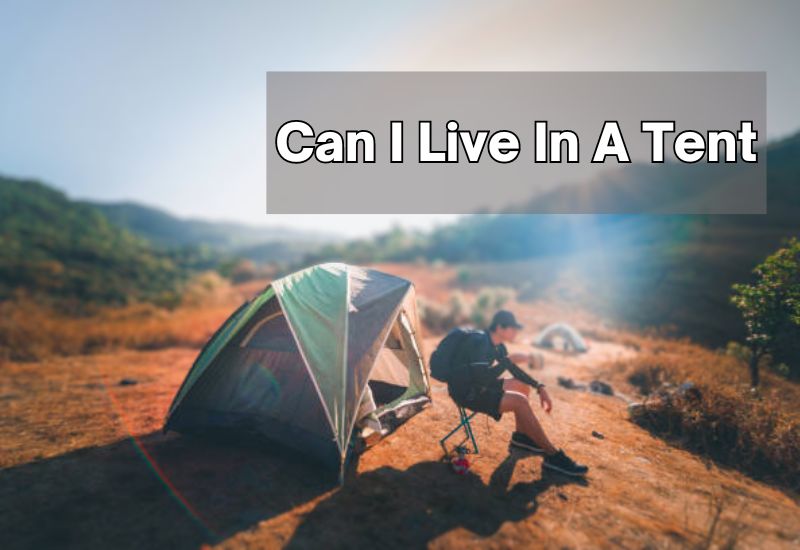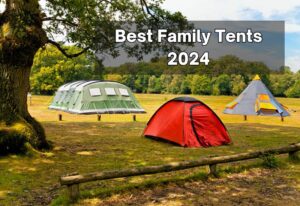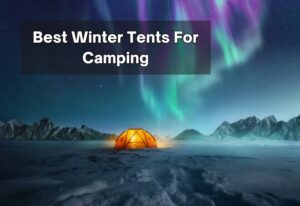Living in a tent offers a unique, minimalist lifestyle, allowing you to connect with nature and enjoy a simpler way of life.
Can I Live In A Tent? Yes, you can live in a tent, but it requires careful planning and preparation. Consider climate, location, and necessary supplies to ensure a safe and comfortable experience.
This guide explores the feasibility, benefits, and challenges of tent living. Discover if this adventurous, eco-friendly option is right for you, considering key factors like location, weather, and necessary gear.
Is Tent Living Feasible?
Living in a tent is feasible but requires thorough planning and adaptability. Important factors include choosing a safe and legal location, ensuring adequate weather protection, and having the right gear.
Considerations such as nearby water sources, emergency access, and local regulations are crucial for a sustainable tent lifestyle.
Choosing the Right Location:
Finding the perfect spot for your tent is crucial. Here are some things to consider:
- Safety and Legal Issues: Check local ordinances and obtain necessary permits for long-term tent living.
- Proximity to Resources: Ensure you’re near water sources and emergency access points.
- Privacy and Security: Choose a spot that’s not too isolated but offers privacy.
Weather Protection Essentials:
Weather can be unpredictable, so being prepared is key:
- Proper Shelter: Invest in a high-quality, weather-resistant tent.
- Insulation and Ventilation: Make sure your tent is well-insulated for cold nights and has ventilation for hot days.
- Emergency Gear: Have tarps and extra stakes on hand to secure your tent during storms.
Must-Have Gear for Tent Living:
Equipping yourself with the right gear makes a big difference:
- Sleeping Essentials: A good sleeping bag and sleeping pad for comfort and warmth.
- Cooking Supplies: Portable stove, fuel, and utensils for meal preparation.
- Lighting and Power: Solar chargers, flashlights, and lanterns to stay illuminated.
Managing Water and Waste:
Staying hydrated and managing waste are vital:
- Water Filtration: Use filters or purification tablets to ensure safe drinking water.
- Hygiene: Set up a basic sanitation system with portable toilets or designated waste areas.
- Eco-Friendly Practices: Follow Leave No Trace principles to minimize your impact.
Adapting to the Tent Lifestyle:
Living in a tent requires some lifestyle changes:
- Simplify Possessions: Only keep essential items to save space.
- Stay Organized: Use storage solutions to keep your tent tidy.
- Mental Preparation: Embrace the simplicity and challenges of tent living.
Legal and Regulatory Considerations:
Understanding the laws is crucial for long-term tent living:
- Permits and Regulations: Ensure you have the necessary permits for your chosen location.
- Stay Informed: Regularly check for updates on local laws and regulations.
- Respect Property: Always camp on designated land and respect private property boundaries.
Tips for Sustainable Tent Living:
Sustainability is key for long-term success:
- Renewable Energy: Use solar panels for power needs.
- Sustainable Food Sources: Consider growing your own food or sourcing from local farmers.
- Minimize Waste: Recycle and compost to reduce your environmental footprint.
Benefits of Tent Living
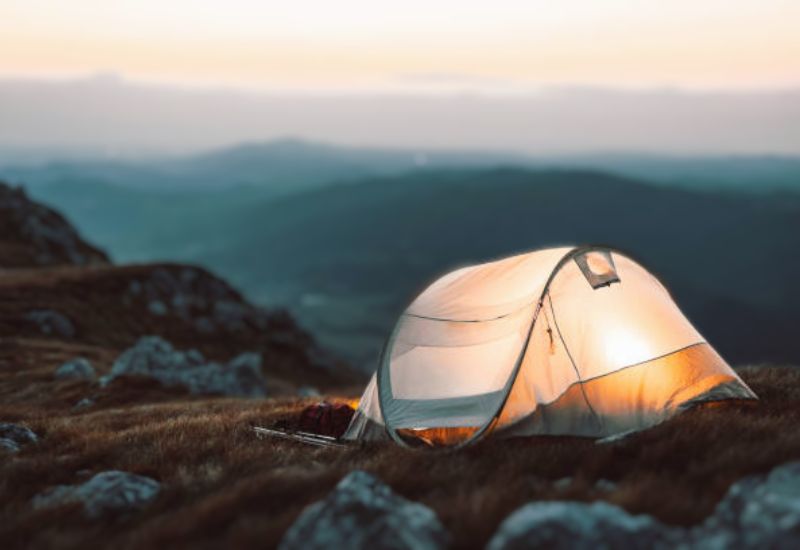
Tent living offers numerous benefits, from reduced living costs to a closer connection with nature. This eco-friendly lifestyle promotes sustainability and can significantly lower your carbon footprint.
Let’s explore the various advantages of tent living.
Lower Living Costs:
- Save on Utility Bills: Tent living eliminates the need for electricity, heating, and cooling systems, reducing your monthly expenses.
- Affordable Housing: Tents are much cheaper than traditional homes, making them an excellent option for those looking to save money.
Closer Connection with Nature:
Tent living allows you to immerse yourself in nature, providing a unique and fulfilling experience. Waking up to the sounds of birds and enjoying the fresh air can greatly enhance your well-being.
Minimalist Lifestyle:
- Declutter Your Life: Living in a tent encourages you to own only the essentials, promoting a minimalist lifestyle.
- Simplify Your Routine: With fewer possessions, you can focus on what truly matters, leading to a simpler and more meaningful life.
Eco-Friendly Living:
Tent living is an eco-friendly option that helps reduce your environmental impact. By using fewer resources and generating less waste, you contribute to a more sustainable planet.
Freedom and Flexibility:
- Mobility: Tents can be easily moved, allowing you to change locations and explore new places without the constraints of a permanent home.
- Adventure: Embrace a sense of adventure and spontaneity by living in different environments and experiencing diverse landscapes.
Health Benefits:
Living in a tent can improve your physical and mental health. Exposure to nature has been proven to reduce stress, boost mood, and enhance overall well-being.
Community and Social Connections:
Tent living often brings people together, fostering a sense of community. Sharing experiences and resources with fellow tent dwellers can create strong social bonds and a supportive network.
Financial Freedom:
By reducing your living expenses, tent living can provide you with greater financial freedom. Use the money saved to invest in experiences, travel, or hobbies that enrich your life.
Sustainable Living Practices:
- Reduce, Reuse, Recycle: Tent living encourages sustainable practices, such as using fewer resources and recycling materials.
- Lower Carbon Footprint: By living simply, you contribute to a lower carbon footprint, helping to protect the environment.
Enhancing Creativity and Innovation:
Living in a tent can stimulate creativity and innovation. The simplicity of tent living allows you to think outside the box and find new ways to solve problems and enjoy life.
Essential Gear for Tent Living
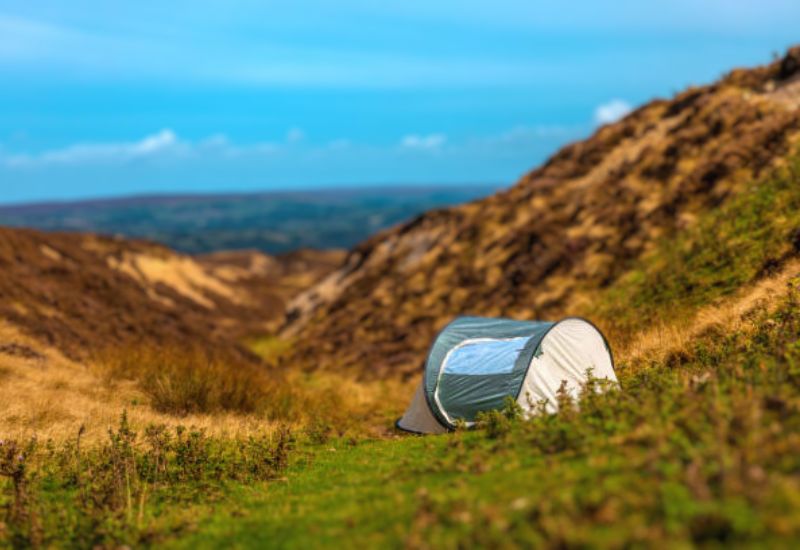
Choosing a Durable Tent
A durable tent is the cornerstone of your tent-living setup. Look for a four-season tent that can withstand various weather conditions.
A sturdy tent with good ventilation and waterproof features will keep you dry and comfortable.
Sleeping Bags and Pads:
Sleeping Bag:
- Temperature Rating: Choose a sleeping bag with an appropriate temperature rating for your climate.
- Material: Synthetic or down-filled sleeping bags offer different levels of warmth and packability.
- Size and Weight: Ensure the sleeping bag is lightweight and fits your body size comfortably.
Sleeping Pad:
- Insulation: A well-insulated sleeping pad keeps you warm by preventing cold ground contact.
- Comfort: Choose a pad with adequate cushioning to ensure a good night’s sleep.
Portable Stove for Cooking:
Cooking while living in a tent requires a reliable portable stove. Here are key points to consider:
- Fuel Type: Choose between propane, butane, or multi-fuel stoves based on availability and convenience.
- Portability: Opt for a compact and lightweight stove that’s easy to carry.
- Ease of Use: Look for stoves with simple setup and ignition features.
Weather-Appropriate Clothing:
Layering System:
- Base Layer: Wicks moisture away from the skin.
- Insulating Layer: Provides warmth.
- Outer Layer: Protects against wind and rain.
Additional Tips:
- Footwear: Waterproof boots keep your feet dry.
- Accessories: Hats and gloves are essential for colder climates.
Water Filtration System:
Access to clean water is vital. Invest in a reliable water filtration system:
- Portable Filters: Small and easy to use, ideal for backpacking.
- Gravity Filters: Suitable for filtering larger quantities of water at camp.
Lighting Solutions:
Proper lighting improves safety and convenience. Consider these options:
- Headlamps: Hands-free and versatile.
- Lanterns: Provide broader illumination for campsites.
- Portable Solar Lights: Eco-friendly and rechargeable.
First Aid Kit:
Always have a well-stocked first aid kit. It should include:
- Bandages and Gauze: For minor cuts and injuries.
- Antiseptic Wipes: To clean wounds.
- Medications: Include pain relievers and any personal prescriptions.
Choosing the Perfect Location
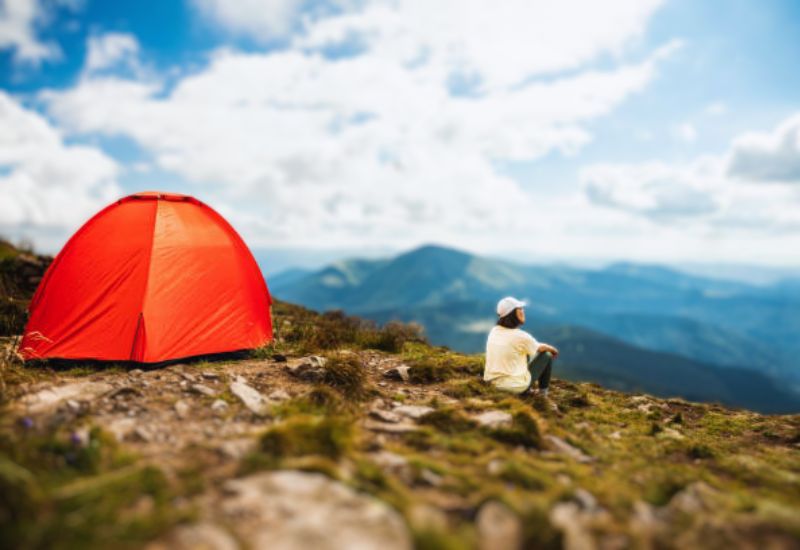
Selecting the right location is vital for tent living. Look for a spot with natural shelter, proximity to water, and legal camping rights.
Avoid areas prone to flooding or dangerous wildlife. Accessibility to roads and emergency services is also important.
Look for Natural Shelter:
- Wind Protection: Choose areas with trees or rocks that act as natural windbreaks.
- Shade: Ensure your spot provides shade during the hottest part of the day.
- Rain Cover: Natural overhangs can offer additional protection from rain.
Proximity to Water:
- Water Source: Find a site near a stream or lake for easy access to water.
- Safe Distance: Camp at least 200 feet from water to avoid flooding risks.
- Water Quality: Check for clean and safe water sources.
Legal Camping Rights:
- Check Regulations: Ensure the location allows camping and you have the necessary permits.
- Respect Boundaries: Stay within designated camping areas to avoid fines.
- Know the Rules: Familiarize yourself with local camping laws and guidelines.
Avoid Areas Prone to Flooding:
- High Ground: Select a campsite on higher ground to prevent flooding.
- Weather Patterns: Be aware of the area’s weather and seasonal changes.
- Ground Condition: Avoid low-lying areas and dry riverbeds.
Be Mindful of Wildlife:
- Wildlife Habitats: Stay away from known wildlife habitats to avoid encounters.
- Food Storage: Store food securely to prevent attracting animals.
- Safety Measures: Know what to do in case of a wildlife encounter.
Accessibility to Roads and Emergency Services:
- Road Access: Ensure your site is accessible by road for easy entry and exit.
- Emergency Services: Camp near areas with reliable access to emergency services.
- Communication: Make sure you have a way to call for help if needed.
Enjoy the Best Camping Spots:
- Scenic Views: Choose locations with beautiful landscapes for a pleasant stay.
- Activities Nearby: Pick spots near hiking trails or other outdoor activities.
- Privacy: Look for areas that offer a sense of seclusion and tranquility.
Weather Considerations for Tents
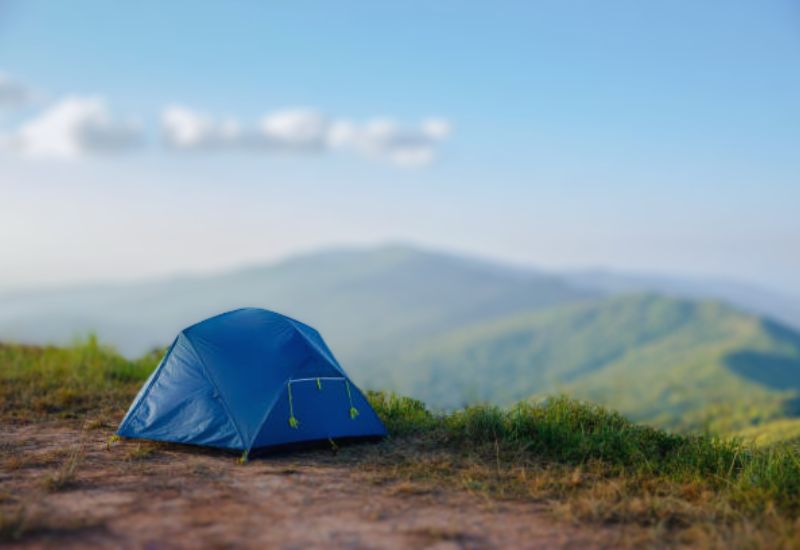
Choosing the Right Tent for Your Climate:
Selecting a tent suitable for your climate is the first step. In hot climates, opt for a tent with excellent ventilation to stay cool.
For rainy areas, ensure your tent has a robust rainfly and sealed seams to keep you dry.
Preparing for Rain:
Rain can be both refreshing and challenging while camping. Here’s how to prepare:
- Use a Rainfly: Make sure your tent has a rainfly to prevent water from seeping in.
- Pitch on High Ground: Avoid low-lying areas where water can pool.
- Waterproof Gear: Store your belongings in waterproof bags to keep them dry.
Handling Extreme Temperatures:
Extreme temperatures can make camping uncomfortable if you’re unprepared.
- Hot Weather: Use a tent with good airflow and a light-colored fabric to reflect sunlight.
- Cold Weather: Choose a tent with a strong frame and thermal insulation to retain heat.
Wind Resistance:
Windy conditions require a sturdy tent to prevent collapse.
- Stake Down Properly: Use strong stakes and guylines to secure your tent.
- Choose a Sheltered Spot: Set up your tent near natural windbreaks like trees or rocks.
Ventilation is Key:
Good ventilation is essential for a comfortable camping experience, especially in hot and humid weather.
- Ensure your tent has multiple vents and mesh windows to allow for airflow, reducing condensation and keeping the interior fresh.
Importance of a Groundsheet:
A groundsheet protects your tent from moisture and sharp objects.
- Use a Footprint: Place a footprint or tarp under your tent to add an extra layer of protection against wet ground and abrasion.
Contingency Plans for Severe Weather:
Always have a contingency plan for unexpected severe weather.
- Check Weather Forecasts: Stay updated on weather conditions before and during your trip.
- Emergency Shelter: Know the location of nearby shelters in case you need to evacuate your tent.
Conclusion
Living in a tent offers a unique, minimalist lifestyle that allows you to connect with nature and enjoy a simpler way of life. While it requires careful planning and preparation, it can be a rewarding and sustainable option.
Consider climate, location, and necessary supplies to ensure a safe and comfortable experience. By choosing the right location, equipping yourself with essential gear, and adopting eco-friendly practices, you can fully embrace the benefits of tent living.
This adventurous lifestyle can lower living costs, promote a closer connection with nature, and enhance overall well-being.
FAQ’s (Can I Live In A Tent)
Is it okay to live in a tent?
Yes, it is okay to live in a tent with proper planning and preparation.
Ensure you choose a safe location, have weather-appropriate gear, and follow local regulations to make your tent living experience safe and comfortable.
Is there a tent you can live in?
Yes, there are tents designed for long-term living.
Look for durable, four-season tents with weather-resistant features, good insulation, and ample space. These tents provide the necessary protection and comfort for extended stays.
How long can you survive in a tent?
You can survive in a tent indefinitely with proper preparation.
Ensure access to essential resources like water, food, and shelter. Adapt to the environment and maintain your tent to make long-term tent living sustainable and comfortable.
Are you allowed to sleep in a tent?
Yes, you are allowed to sleep in a tent, but it depends on local regulations and property rights.
Always check local ordinances, obtain necessary permits, and respect private property boundaries to ensure you are camping legally and responsibly.
Can you live in a tent legally in the UK?
Living in a tent legally in the UK is difficult due to strict regulations.
Long-term tent living usually requires landowner permission and adherence to local camping laws. Always verify local ordinances before setting up.
Is free camping legal in England?
Free camping, or wild camping, is generally illegal in England without landowner permission.
Exceptions exist in some national parks and areas like Dartmoor, but it’s essential to check local regulations and obtain necessary permissions.

